Best Crypto Exchanges in Sri Lanka
.webp)
Summary: Sri Lanka’s cryptocurrency landscape is evolving under a watchful regulatory environment, with the Central Bank overseeing the industry. Sri Lankan investors have access to several reliable international exchanges that combine low fees, security, and local funding options.
Here are the six best crypto platforms supporting Sri Lankan Rupee (LKR) deposits:
Bybit is our top pick for Sri Lankan investors as it provides a multilingual interface, support for local payment methods, a diverse crypto selection and maintains global compliance.
Available Assets
2,100+ Cryptocurrencies
Fees
0.1% Spot Trading Fee
LKR Deposit Methods
Bank Transfer, Cards, Apple Pay, Google Pay
Top Crypto Trading Platforms in Sri Lanka
Sri Lanka’s crypto market operates in a developing yet closely monitored setting, with the Central Bank advising traders to use platforms that meet international compliance standards. Below is a comparison table of the leading platforms supporting Sri Lankan Rupee (LKR) deposits, focusing on deposit methods, fees, security, supported cryptocurrencies, and features.
1. Bybit
Bybit has built a strong reputation among Sri Lankan traders for its high-speed matching engine, deep liquidity, and a broad selection of trading products. Since launching in 2018, the platform has grown to serve over 74 million registered users, recording daily trading volumes above $35 billion.
In Sri Lanka, Bybit gives traders access to spot, perpetual, and inverse futures markets, with leverage options that scale up to 200x. Its trading bots and copy trading system have become popular for new users, allowing them to follow top-ranked traders while tracking historical performance metrics.
Bybit Earn adds another dimension, with flexible savings accounts, fixed-term staking, and yield-generating products that cater to both conservative and high-risk strategies. The integrated Web3 hub lets Sri Lankans connect their wallets to explore dApps, NFT marketplaces, and DeFi protocols.
Platform Highlights:
- Fees: Spot trading from 0.1%, futures maker fees from 0.01%.
- Supported Assets: 2,100+ cryptocurrencies.
- Regulation & Licensing: Operates globally under multiple international registrations.
- LKR Deposit Methods: Bank transfer (via P2P), Visa, Mastercard, Apple Pay, Google Pay, Samsung Pay.
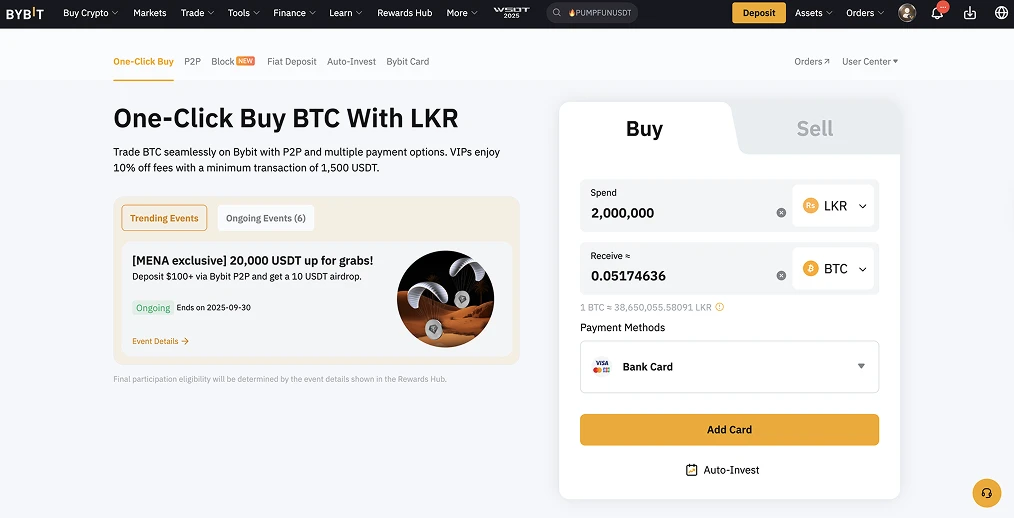
2. Binance
Binance is the largest cryptocurrency exchange in the world, serving over 270 million registered users across 180+ countries. Its 24-hour trading volume often surpasses tens of billions of dollars, backed by liquidity deep enough to handle both retail and institutional order flow without slippage concerns.
The platform supports spot, margin, and futures markets, giving access to over 500 digital assets with 100x leverage supported. Binance’s Copy Trading service enables users to mirror trades from top-performing investors, complete with performance history and real-time position tracking.
Peer-to-peer (P2P) trading is another major draw in Sri Lanka, allowing direct LKR transactions with no intermediary banking fees. Beyond trading, Binance Earn offers flexible and locked savings, staking, dual investment products, and auto-invest plans for cost averaging into assets over time.
Platform Highlights:
- Fees: Spot trading from 0.1%, futures maker fees from 0.02%.
- Supported Assets: 500+ cryptocurrencies.
- Regulation & Licensing: Operates under multiple global registrations with strong AML/KYC enforcement.
- LKR Deposit Methods: Peer-to-peer transfers, bank deposits (via P2P), Visa, Mastercard.
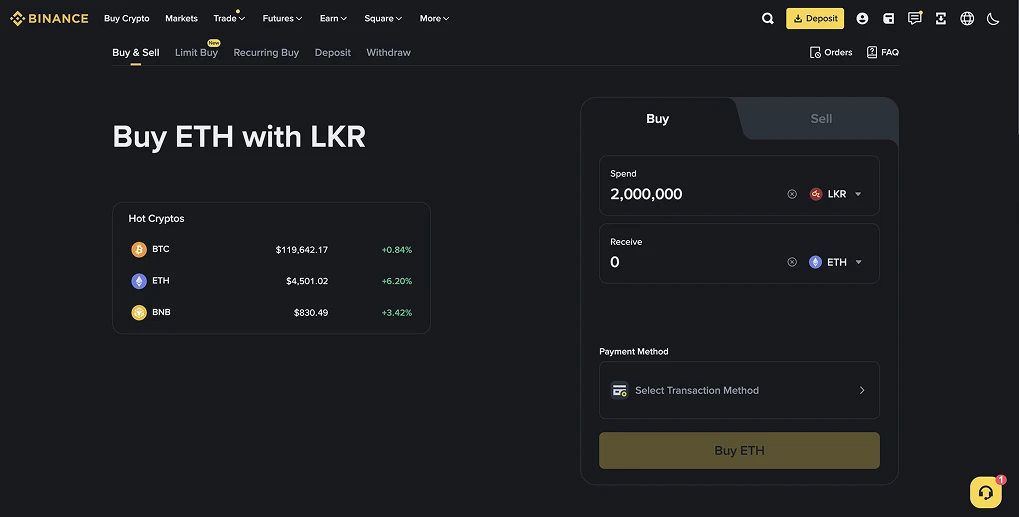
3. Kraken
Kraken is one of the most established cryptocurrency exchanges in the world, having operated since 2011. With a quarterly trading volume exceeding $207 billion, it has earned a reputation for security, transparency, and deep market liquidity, making it a top choice for retail traders and institutions.
The platform’s security track record is reinforced by Proof of Reserves audits, multi-layered account protections, and cold storage for client assets. Kraken’s product suite includes spot markets, margin trading with up to 5x leverage, perpetual futures contracts and tokenized U.S. stocks and ETFs.
The Kraken Pro interface delivers professional-grade charting, order management, and API integrations for algorithmic strategies, while its OTC desk provides white-glove executions. The platform also supports auto-invest features, recurring buys, and instant crypto conversions at live market rates.
Platform Highlights:
- Fees: Spot trading from 0.16%.
- Supported Assets: 475+ cryptocurrencies, plus tokenized stocks and ETFs.
- Regulation & Licensing: Licensed by multiple international authorities and adheres to AML/KYC standards.
- LKR Deposit Methods: Credit cards, debit cards.

4. OKX
OKX is a global exchange known for blending advanced trading tools with seamless access to the Web3 ecosystem. The platform’s integration with TradingView allows users to execute trades directly from industry-grade charts, making it a strong choice for those who value technical analysis.
Spot, margin, and derivatives markets are available, with perpetual and expiry futures offering leverage options for more advanced strategies. Options traders can tap into custom multi-leg orders and futures spreads, while mirror trading tools let users follow the positions of top traders.
Where OKX stands out is in its built-in Web3 wallet, enabling direct interaction with DeFi protocols, NFT marketplaces, and dApps without leaving the platform. Users can stake tokens, provide liquidity, and explore yield farming opportunities across multiple networks.
Platform Highlights:
- Fees: Spot trading from 0.08%, derivatives maker fees from 0.02%.
- Supported Assets: 350+ cryptocurrencies.
- Regulation & Licensing: Operates under multiple international registrations; compliance varies by jurisdiction.
- LKR Deposit Methods: Peer-to-peer marketplace.
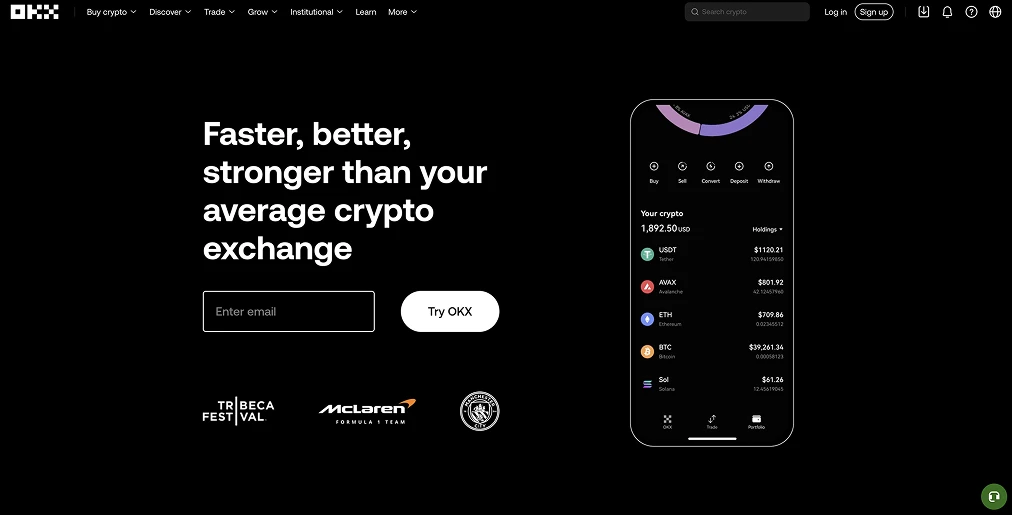
5. KuCoin
KuCoin is the largest altcoin-focused exchange, serving over 40 million users in more than 200 countries. Known for its deep markets and aggressive asset listings, the platform regularly handles over $9 billion in daily trading volume, giving traders access to liquidity across 900+ cryptocurrencies.
Whether you’re trading majors like Bitcoin and Ethereum or looking for early access to emerging tokens, KuCoin’s Spot, Futures, and Margin markets provide flexible options. The futures and spot trading bots are another standout, allowing automated strategies to run 24/7 without constant monitoring.
The KuCoin Earn service offers various passive income opportunities, including flexible savings, fixed-term staking, crypto lending, and dual investment products. Staking rewards are competitive, and through the GemSPACE program, traders can access exclusive new coin listings.
Platform Highlights:
- Fees: Spot trading from 0.1%, futures maker fees from 0.02%.
- Supported Assets: 900+ cryptocurrencies.
- Regulation & Licensing: Operates under multiple global licensed; adheres to AML/CFT standards.
- LKR Deposit Methods: Peer-to-peer marketplace.

6. Gate
Gate is one of the most comprehensive crypto trading platforms in the world, with over 34 million registered traders. Since its launch in 2013, it has built a reputation for listing both established coins and hard-to-find emerging tokens, now offering access to 3,500+ cryptocurrencies.
The platform supports spot trading, perpetual futures, options, and copy trading, making it suitable for all trading styles. Advanced traders can use TradingView-powered charts for technical analysis, while newer users can opt for Quick Buy to purchase crypto in just a few steps.
Security and transparency are core to Gate.io’s operations, with a 126% total reserve ratio verified through on-chain Proof of Reserves, ensuring all user balances are fully backed. The platform offers multi-device access via mobile and desktop apps and 24/7 multilingual customer support.
Platform Highlights:
- Fees: Spot trading from 0.2%, futures maker fees from 0.015%.
- Supported Assets: 3,500+ cryptocurrencies.
- Regulation & Licensing: Not licensed in Sri Lanka but remains accessible to residents.
- LKR Deposit Methods: Credit cards, debit cards, Apple Pay, Google Pay.
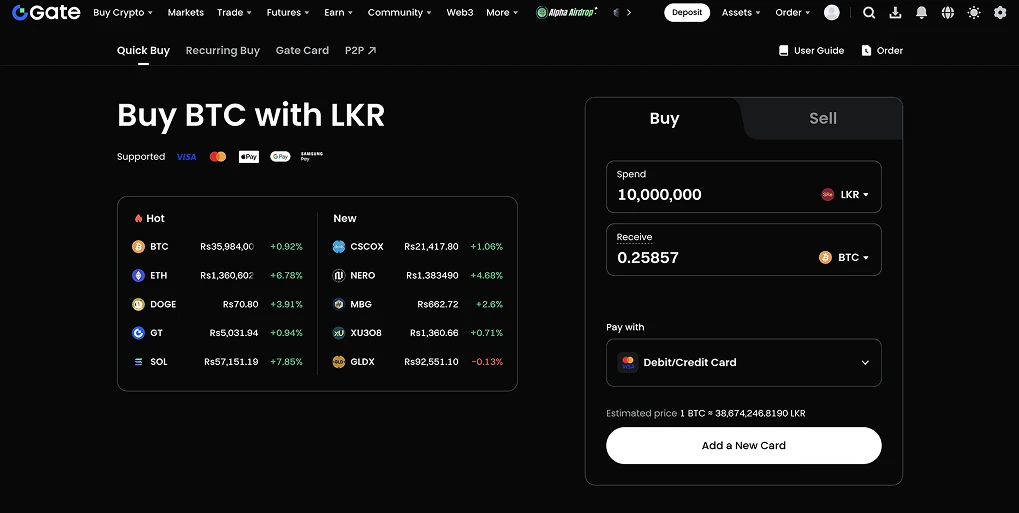
Is Cryptocurrency Regulated in Sri Lanka?
Sri Lanka does not recognize cryptocurrencies as legal tender, and the Central Bank of Sri Lanka has repeatedly issued warnings about their risks, market volatility, scams, lack of oversight, and potential loss of foreign currency.
Banking-level guidance shapes broader enforcement: under the Foreign Exchange Act, EFT cards cannot be used for crypto transactions. Although cryptocurrencies remain legal to purchase, Sri Lanka lacks legislation specific to digital assets. Instead, existing laws cover crypto-related activity.
However, policy is shifting as Sri Lanka prepares for its upcoming FATF mutual evaluation, the Central Bank Governor confirmed ongoing discussions with the Finance Ministry and the Ministry of Digital Economy to register and monitor cryptocurrency service providers (VASPs) under AML/CFT standards.
How is Crypto Taxed in Sri Lanka?
Sri Lanka does not have a dedicated cryptocurrency tax law. The Inland Revenue Department (IRD) applies existing tax provisions to digital asset transactions and generally treats cryptocurrencies as intangible assets. Tax obligations depend on how the assets are acquired, used, or sold.
Key taxes and rules:
- Capital Gains Tax (CGT): Gains from selling crypto may be taxed at 10% for individuals (30% for companies) if the asset is classified as an “investment asset” under current rules. The IRD determines this classification.
- Income Tax: Crypto earned from mining, staking, running a trading business, or other commercial activities is taxed at standard income tax rates, generally 12% to 24% for individuals.
- VAT on Purchases with Crypto: There is no explicit VAT rule for paying with cryptocurrency. Standard VAT could apply if the transaction is treated as a regular sale in local currency, but this is not formally defined.
- 18% VAT on Foreign Digital Services: From 1 October 2025, services from overseas providers, including global crypto exchanges and payment platforms, will attract 18% VAT under new rules published in the government gazette.
- Record-Keeping: Keep detailed records of all trades, conversions, and payments, including dates, amounts, and purposes, to remain compliant and avoid IRD penalties.
Cryptocurrency Adoption in Sri Lanka
Sri Lanka’s cryptocurrency market is gaining traction, driven by rising interest among retail investors, expanding access to global exchanges, and a growing number of local platforms enabling Sri Lankan Rupee (LKR) transactions.
The number of cryptocurrency holders in Sri Lanka is set to reach approximately 1.16 million people by 2026. This equates to 4.56% of the population in 2025, rising to 4.97% the following year.
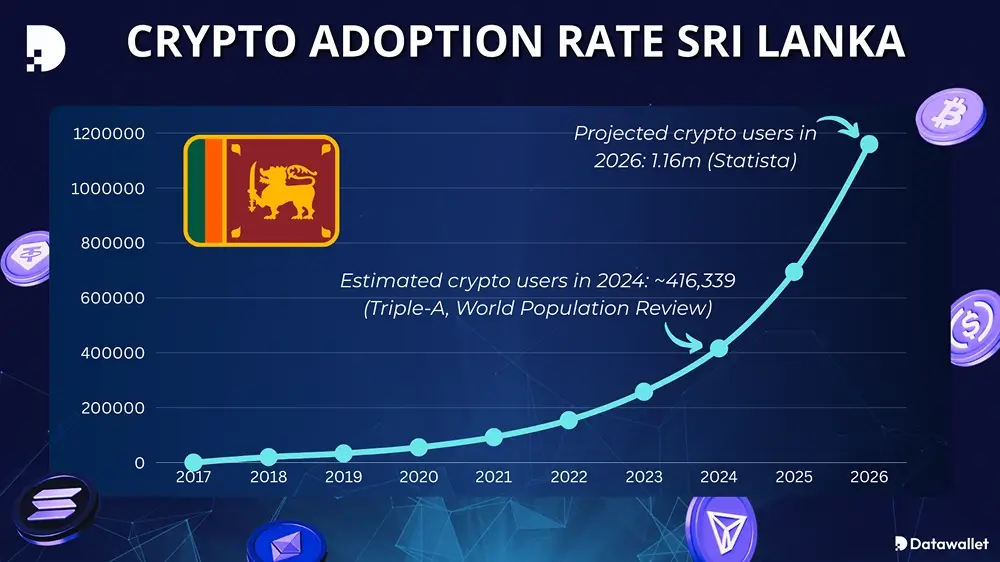
How to Buy Bitcoin in Sri Lanka
Sri Lankan investors interested in purchasing Bitcoin (BTC) should use reputable cryptocurrency exchanges that follow international compliance standards and offer strong asset protection. Here is a quick guide to buying BTC in Sri Lanka:
- Select a Crypto Exchange: Choose a platform that supports Sri Lankan Rupee (LKR) deposits. Many local traders use reputable global exchanges with LKR on-ramp options, peer-to-peer marketplaces, or internationally regulated platforms.
- Create Your Account: Register on your chosen exchange and complete the Know Your Customer (KYC) process. This typically involves submitting a government-issued ID such as a National Identity Card, passport, or driver’s license.
- Deposit Sri Lankan Rupees (LKR): Fund your account using supported local payment methods. These can include bank transfers through domestic banks, card payments via authorized processors, or peer-to-peer transfers verified by the platform.
- Purchase Bitcoin (BTC): Once funds are available, navigate to the Bitcoin trading page. Specify the amount in LKR you wish to spend or the BTC quantity you want to purchase, review the transaction details, and confirm your order.
- Secure Your Bitcoin: For maximum protection, transfer your BTC from the exchange to a private wallet. Hardware wallets like Ledger or Trezor provide the highest level of security.
By following these steps, Sri Lankan investors can enter the Bitcoin market more securely, ensuring they trade on platforms that prioritize safety, compliance, and transparent operations.
Final Thoughts
Sri Lankan traders have more choice than ever when it comes to secure, low-fee, and feature-rich cryptocurrency platforms. The key is to select an exchange that not only supports LKR funding but also meets strong compliance standards and offers the tools you need, whether that’s copy trading, institutional services, DeFi access, or competitive staking.
By matching your goals with the strengths of each platform, you can trade and invest with greater confidence while staying aligned with evolving local regulations.
Frequently asked questions
Are peer-to-peer crypto transactions legal in Sri Lanka?
Yes, P2P trading is legal but unregulated. The Central Bank advises using reputable platforms with robust KYC and anti-money laundering safeguards to reduce fraud and dispute risks.
Do Sri Lankan crypto traders need to report profits for tax purposes?
Yes. Profits from trading, staking, or selling crypto may be subject to capital gains tax or income tax under Sri Lanka’s existing tax framework, so keeping accurate transaction records is essential for compliance.
How can Sri Lankan crypto users safely store their assets away from exchanges?
The most secure option is cold storage, keeping private keys offline using hardware wallets or paper backups. Sri Lankans should consider well-regarded brands like Ledger or Trezor, enable backups of seed phrases in secure locations, and avoid using hot wallets for long-term holdings.
What red flags should Sri Lankan users watch for to avoid exchange scams?
Be wary of unofficial domains, fake apps impersonating popular exchanges, and improbable account sign-up incentives. Always verify web addresses, install apps only from official sources, and confirm Proof of Reserves or regulatory credentials before depositing funds.

Written by
Antony Bianco
Head of Research
Antony Bianco, co-founder of Datawallet, is a DeFi expert and active member of the Ethereum community who assist in zero-knowledge proof research for layer 2's. With a Master’s in Computer Science, he has made significant contributions to the crypto ecosystem, working with various DAOs on-chain.

.webp)

.webp)





